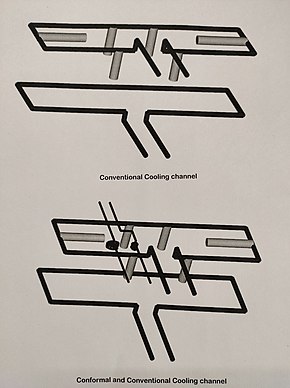Conformal cooling channel
 Basic concept diagram of conformal and conventional cooling channels | |
| Process type | Injection moulding process |
|---|---|
Conformal cooling channel is a cooling passageway which follows the shape or profile of the mould core or cavity to perform rapid uniform cooling process for injection moulding or blow moulding processes.
The conformal cooling technology
Conformal cooling is a technology utilized in the plastic injection molding industry to improve the efficiency and quality of molded parts. Traditional cooling channels in molds are typically straight and uniform, leading to uneven cooling and thus, longer cycle times and potential defects in the finished product.
Conformal cooling, on the other hand, involves the creation of cooling channels that conform precisely to the shape of the part being produced. These channels are strategically designed to follow the contours of the mold, ensuring uniform cooling and reducing cycle times significantly. This results in faster production rates, improved part quality, reduced energy consumption, and increased tooling lifespan.
By optimizing the cooling process, conformal cooling technology enables manufacturers to produce complex, high-precision parts with greater efficiency and consistency. This innovative approach has revolutionized the plastic injection molding industry, offering numerous benefits to manufacturers seeking to enhance their competitiveness in the market.



Process overview of conformal cooling in the plastic injection industry
Design Stage
The process begins with the design of the mold, which includes the creation of the cavity and core that define the shape of the plastic part to be produced. During the design stage, engineers identify areas of the mold where heat tends to accumulate and impact the quality of the molded part.
Cooling Channel Design
Engineers design cooling channels that closely follow the contours of the mold cavity and core. These channels are strategically placed to ensure uniform cooling across the entire surface of the mold, thereby minimizing warpage, reducing cycle times, and improving part quality.
Manufacturing
Cooling channels can be integrated into the mold using traditional machining processes and additive manufacturing techniques such as 3D printing.
Optimization
Computational fluid dynamics (CFD) simulations are often used to optimize the design of cooling channels. These simulations help engineers predict and analyze the flow of coolant through the channels, identify potential hot spots, and refine the design to achieve optimal cooling efficiency.
Manufacturing
Once the design is finalized, the mold is manufactured using the chosen production method, whether it be additive manufacturing or traditional machining. Cooling channels are integrated into the mold according to the designed specifications.
Coolant Circulation
During the injection molding process, a coolant (typically water) is circulated through the cooling channels to absorb heat from the mold. The coolant removes heat from the mold, allowing the plastic material to solidify and cool more rapidly.
Benefits
By minimizing cooling time, manufacturers can increase throughput and reduce energy consumption, resulting in cost savings and improved competitiveness. Conformal cooling is a sophisticated technique that optimizes the cooling process in plastic injection molding by integrating cooling channels that conform to the shape of the molded part. Through careful design, simulation, and optimization, conformal cooling enables manufacturers to achieve faster cycle times, higher part quality, and increased efficiency in production.
History and the patent
The process was developed in 1999 by Klaus Schmetz - USA patent number 5,855,933. The company applying for the patent was "Innova", based in Germany. This became the company "CONTURA Mold Temperature Control GmbH" in 2003.
Further reading
- Emanuel Sachs; Edward Wylonis; Samuel Allen; Michael Cima; Honglin Guo (May 2000). "Production of injection molding tooling with conformal cooling channels using the three dimensional printing process". Polymer Engineering & Science. 40 (5): 1232–1247. doi:10.1002/pen.11251. hdl:2152/69894.
- Xiaorong Xu, Emanuel Sachs and Samuel Allen, The design of conformal cooling channels in injection molding tooling Polymer Engineering & Science, Volume 41, Issue 7, July 2001,pages 1265–1279
- D.E. Dimla; M. Camilotto; F. Miani (15 May 2005). "Design and optimisation of conformal cooling channels in injection moulding tools". Journal of Materials Processing Technology. 164–165: 1294–1300. doi:10.1016/j.jmatprotec.2005.02.162.
- J.C. Ferreira; A. Mateus (25 November 2003). "Studies of rapid soft tooling with conformal cooling channels for plastic injection moulding". Journal of Materials Processing Technology. 142 (2): 508–516. doi:10.1016/S0924-0136(03)00650-2.
- K W Dalgarno, T D Stewart, 2001 Manufacture of production injection mould tooling incorporating conformal cooling channels via indirect selective laser sintering, Proceedings of the Institution of Mechanical Engineers, Part B: Journal of Engineering Manufacture, 215, 1323-1332,
- Au K. M.; Yu K. M. (2007). "A scaffolding architecture for conformal cooling design in rapid plastic injection moulding". The International Journal of Advanced Manufacturing Technology. 34 (5–6): 496–515. doi:10.1007/s00170-006-0628-x. S2CID 111289536.
- Au K.M.; Yu K.M.; Chiu W.K. (2011). "Visibility-based conformal cooling channel generation for rapid tooling". Computer-Aided Design. 43 (4): 356–3. doi:10.1016/j.cad.2011.01.001. hdl:10397/17785.
- Park H. S.; Pham N. H. (2009). "Design of conformal cooling channels for an automotive part". International Journal of Automotive Technology. 10 (1): 87–93. doi:10.1007/s12239-009-0011-7. S2CID 110942233.
- Au K.M.; Yu K.M. (2011). "Modeling of multi-connected porous passageway for mould cooling". Computer-Aided Design. 43 (8): 989–1000. doi:10.1016/j.cad.2011.02.007. hdl:10397/18795.
- Au K. M.; Yu K. M. (2006). "Variable radius conformal cooling channel for rapid tool". Materials Science Forum. 532–533: 520–523. doi:10.4028/www.scientific.net/msf.532-533.520. hdl:10397/28534. S2CID 137428436.
- Au K.M.; Yu K.M. (2014). "Variable Distance Adjustment for Conformal Cooling Channel Design in Rapid Tool". Journal of Manufacturing Science and Engineering. 136 (4): 044501. doi:10.1115/1.4026494.
